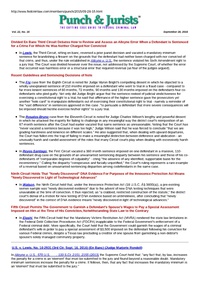A Minnesota jury convicted James Fry of five counts of securities fraud, four counts of wire fraud, and three counts of making false statements to the Securities and Exchange Commission, in connection with a Ponzi scheme orchestrated through a hedge fund. The district court (Judge Richard Kyle of the …
This case is noted as a good example of the lengths to which the Federal Government will go to cripple the families of convicted felons - in this case by garnishing the defendant’s wife’s wages in order to collect a measly $2,900 special assessment imposed on the husband at …
In U.S. v. Rosales-Bruno, 676 F.3d 1017 (11th Cir. April 6, 2012) (“Rosales-Bruno I”), the Eleventh Circuit considered the appeal of Jesus Rosales-Bruno, who argued that the district court (Judge K. Michael Moore of the S,D,Fla.) had committed error in imposing an 87 month sentence following his plea of …
In Alleyne v. U.S., 570 U.S. ___. 133 S.Ct. 2151, 2155 (2013), the Supreme Court held that: “any fact that, by law, increases the penalty for a crime is an ‘element’ that must be submitted to the jury and found beyond a reasonable doubt. Mandatory minimum sentences increase the …
This is a rare decision in which a Federal appellate court actually reversed a defendant’s sentence based upon an unwarranted sentencing disparity with his co-defendants.
Although 18 U.S.C. § 3553(a)(6) does direct sentencing judges to consider "the need to avoid unwarranted sentencing disparities among defendants with similar records who …
In 2004, Congress enacted the Innocence Protection Act (herein the “IPA”), which is codified in part at 18 U.S.C. § 3600, Essentially, the IPA allows Federal prisoners to move for court-ordered DNA testing under certain specified conditions. One of the provision of the IPA - namely § 3600(a)(10) - …
